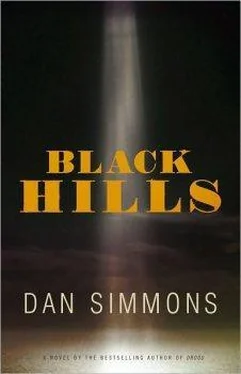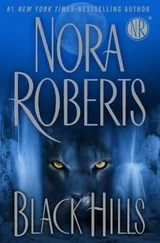Paha Sapa also realizes why Limps-a-Lot and his people call the place O’onakezin , or Place of Shelter. The Black Hills, he sees, are the dark heart of the heart of this entire continent he can now see spreading away to either side until the haze near the curve of the horizon hides the details. It is the place where both animals and the Natural Free Human Beings can go to shelter when the winter winds howl too terribly on the plains and the game all disappears. This must be why Angry Badger and the other men also call the Black Hills the “Meat Pack.” Paha Sapa, floating easily on his belly with his arms wide while he looks down at the evening shadows outlining the high peaks, understands that there will always be game and shelter in the Black Hills for his people.
Then he sees something moving in the Black Hills—something gray and huge rising up out of the black trees as if new mountains were being born. They seem to be human forms, four of them, and from their size even at this distance, they must be hundreds of feet tall.
But he cannot make out details. Suddenly the peaceful feeling he’s had since lying on the ground is gone and his heart is pounding wildly, but he has the sense that the giants are pale wasichus —monster Wasicun.
Then the huge, gray forms lie down again and pull the earth over them like blankets and are again covered and hidden by dark soil and darker trees.
Paha Sapa begins to settle earthward. He does so slowly, the rays from the setting sun painting him bright red—he vaguely wonders if those in the village are looking up at him—but he does so with a heart and spirit that remain perturbed and disturbed. He is not sure what he saw below, but he knows it is not a good thing.
Paha Sapa opens his eyes and he is lying on his back in the little clearing in the sagebrush. Somewhere a coyote calls. Or perhaps it is a Pawnee or Crow or Shoshoni warrior in a raiding party making ready to fall upon the village with bows and rifles and tomahawks.
Paha Sapa is too tired and disturbed to care. He gets to his feet slowly and begins trudging back to the village. The coyote is answered by several other coyotes. They are only coyotes.
The next year, when Paha Sapa confesses about his small-vision-backward-touching to Limps-a-Lot, he refuses to tell the details of the few times he has experienced small-vision-forward-touching because he has seen forward to people dying. He will not mention his touch-the-earth-to-fly times because he begins not to believe in them himself.
When he gets home, Three Buffalo Woman does beat him (but with no real intention to hurt) for getting his second-best deer-hide shirt bloody.
Chapter 5 George Armstrong Custer

Libbie, my darling Libbie, my dearest Libbie, Libbie my love, my life, my everything, my Libbie—
I need you, my darling girl.
I have been lying here in the dark thinking of the time five weeks ago on May 17—was it only five weeks ago?—when I led the regiment out of Fort Abraham Lincoln on this mission. You will recall, my dearest, that the day started cold and foggy before sunrise. I had the men eat hardtack and bacon, just as they would for the next month on the trail. Then General Terry and I marched the men through the rising mists to the fort—you always tell me that you wonder why our frontier forts have no stockades, my love—and then around the parade ground in columns of four so as to reassure the anxious wives and families and troopers we were leaving behind.
But you were not left behind then, my darling girl, my love. The other officers had to bid farewell to their families outside the fort, but you rode along with us that day, along with my sister, Maggie, and my niece Emma. Do you remember as we passed Suds Row, the married enlisted men’s quarters, all the women holding their babies and toddlers and even older children up and out toward us as they wailed? It made me think of a Triumph where the Roman general has returned in glory, only a bizarrely reversed one in this case, before any battles, where the wives of perfectly healthy troopers decide they are widows and treat their babes like orphans.
We had more than seven hundred troopers in our line that day, thirty-one officers (most of them riding in the mass with you and me and Maggie and Emma), forty-five scouts and guides, and those three extra companies of infantry with that artillery detachment of four guns that followed those first days as an escort. (Yes, perhaps I should not have turned down the two batteries of Gatling guns Terry wanted me to take—but I’m sure you remember, my dearest, how those damned guns had slowed us down so on previous patrols, frequently pulling horses and men down with them when they tumbled into ravines or creek beds. A good cavalry unit has to travel light. No, if I were to do it again, I would still leave the Gatling guns behind.)
What a sight the regiment and its escort must have been that morning. The column stretched for more than two miles. I know that the regimental band was playing “The Girl I Left Behind Me” and “Garry Owen”—all through the War I loved that latter song, but I confess that I have been growing weary of it in these later years, my dear—but you and I couldn’t really hear the music because of the clatter of our horses’ hooves, the rumble of the hundred and fifty wagons, and the constant bellowing of the herd of cattle we’d brought with us.
It did not matter.
None of that departure matters except what happened thirteen miles down the trail, when it was time for you to turn back to the fort. Do you remember? I know you do, my love. The memory of it is what woke me from my cold slumbers here.
The group of us, including Maggie and Emma and my striker, Private Burkham, and the paymaster’s old wagon with its small escort, rode back about half a mile behind the column for us to say our good-byes. You surprised me by dismounting and suggesting that we—just you and I—take a walk among the willows that rose along the river there. These were the only high trees and shrubs for many miles; all the rest, back to Fort Lincoln and forward to where we were headed, was flat, open prairie.
We’d walked less than fifty yards from Burkham and the wagon and the other women when you suddenly seized me and kissed me hard. You removed my hat and ran your hand over my short-cropped hair, smiling as you did so. You did not seem to miss what you always called my “lovely curly locks.” Then you took the flat of your hand and began rubbing me below my belt buckle.
“Libbie…” I said, glancing back over my shoulder and over the thick willows to where I could still see the heads of Maggie and Emma, since they had remained mounted.
“Hush,” you said.
And then you went to your knees, but not—I remember clearly—until you had swished out the skirt of your dress (you wore my favorite that day, the blue one with the corn silk little flowers on it) and your petticoats so they would not be stained by the damp grass.
And then you unbuttoned my fly.
“Libbie…”
But I could say no more, my darling, for you had taken me into your soft hands and then into your mouth, and I forgot Burkham and the waiting wagons, forgot my sister and my niece, forgot even the seven hundred men and hundred and fifty wagons and hundreds of cattle with the regiment now leaving me behind.
I forgot everything except the stroking of your hands, the warmth of your mouth, the movement of your lips and tongue upon me.
Читать дальше













